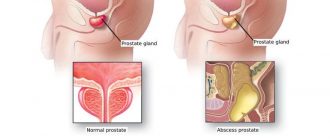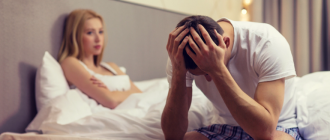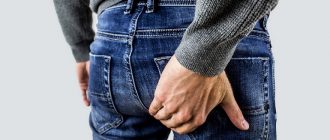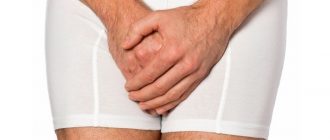If the prostate hurts after ejaculation, this may be evidence of many pathologies of the male genitourinary system. It is not possible to determine a specific disease by symptoms alone, because other manifestations may be similar. In some cases, the pathology may not be isolated or may be caused by another pathology. Therefore, it is necessary to undergo a fairly large number of diagnostic procedures that will help to accurately diagnose and prescribe treatment.
Causes
The causes of pain in the prostate or perineum after ejaculation are always due to a pathological process. Most often these are:
- Vesiculitis (spermatocystitis) is an inflammation of the seminal vesicles.
- Orchitis is inflammation of the testicles.
- Epididymitis is inflammation of the epididymis (has similar symptoms to orchitis).
- Testicular torsion (the easiest pathology on this list to diagnose).
- Prostatitis is inflammation of the prostate gland, one of the most likely diseases with this symptom.
- Benign prostatic hyperplasia is a tumor of the prostate, better known as an adenoma.
- Prostate cancer.
- The most common sexually transmitted diseases are chlamydia, trichomoniasis, gonorrhea, ureaplasmosis, mycoplasmosis.
There is no simple way to independently identify a specific disease. A burning sensation in the prostate after ejaculation is one of the common characteristic signs of each of them; other symptoms can also be common, so a comprehensive diagnosis is required.
Separately, we can highlight another cause of pain in the perineum after ejaculation - mechanical injury.
Diagnostics
If your prostate hurts after sex or other unpleasant sensations occur in the perineum, you should first be examined by a urologist.
The appointment begins with the patient telling about his complaints and taking an anamnesis. Next, a visual examination of the genital organ, palpation of the scrotum and prostate gland will be carried out. Already at this stage it is possible to detect testicular torsion. If this diagnosis is not confirmed, additional laboratory and instrumental examinations will be prescribed:
- General urine and blood tests.
- Biochemistry of blood.
- Microscopic analysis and bacterial culture of prostate secretion.
- Spermogram.
- Ultrasound, TRUS, CT or MRI of the pelvic organs.
- Urography and uroflowmetry (study of urination).
- Urethral swab (to check for STDs).
- Biopsy (if PSA blood test results are ambiguous and there is a suspicion of prostate cancer).
This number of procedures is necessary because most diseases require confirmation by several examinations to make an accurate diagnosis, and in some cases there may be several pathologies. Often they can be interrelated, for example, a sexually transmitted infection can cause, in addition to its own symptoms, prostatitis or orchitis, or orchitis can arise as a complication of prostatitis with ineffective treatment.
Treatment
Therapy is carried out depending on the diagnosis of the disease. Most often, treatment is carried out using conservative methods - medications are prescribed, and physiotherapeutic procedures may also be prescribed.
Medicines usually include the following groups of drugs:
- antibiotics (if the disease is caused by infection);
- antispasmodics;
- analgesics;
- non-steroidal anti-inflammatory drugs.
In the most complex or advanced cases, surgical intervention may be prescribed. Most often this occurs with purulent orchitis or late stages of hyperplasia and prostatitis.
Taking into account the specifics of diseases and their impact on psychological health, psychotherapy may be prescribed.
Prevention
To reduce the risk of genitourinary system diseases in men, it is recommended:
- exclude unprotected sexual intercourse;
- avoid prolonged abstinence or excessively intense sex, as well as interruptions of sexual intercourse;
- support the functioning of the immune system;
- lead an active lifestyle (but too much exercise can also cause problems);
- watch your diet, give up bad habits;
- avoid local and general hypothermia, as well as overheating of the body;
- prevent injury to the perineum (this is possible during horseback riding, cycling, long-term driving or lifting heavy objects).



